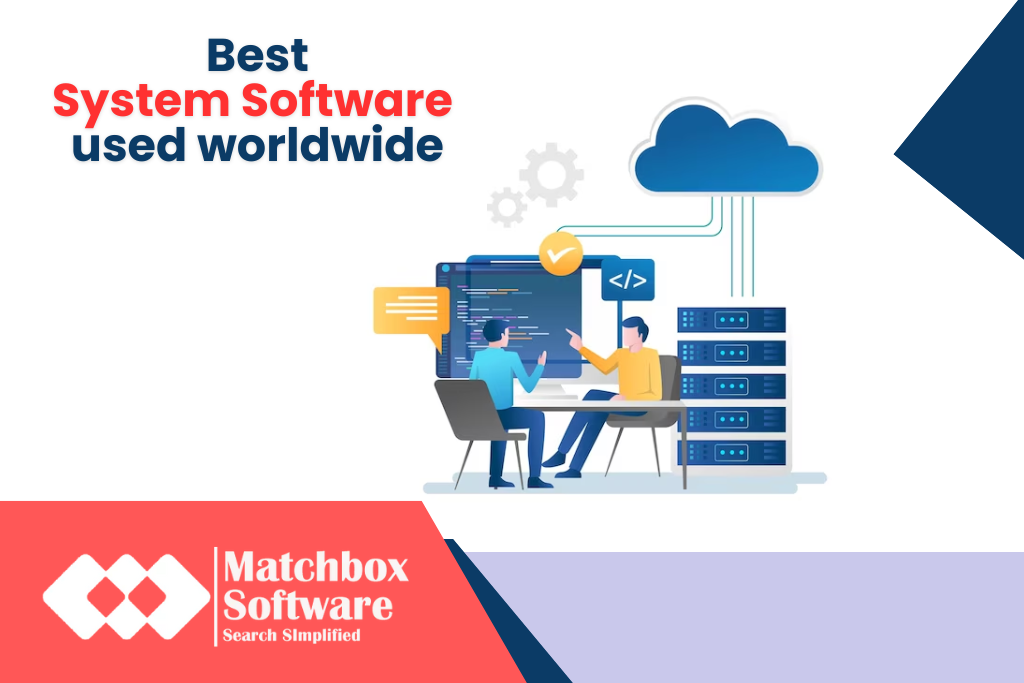What is System Software? Best System Softwares Used By World Wide

System software is the unsung hero in the complex world of computing, quietly ensuring the smooth operation of our devices. This blog intends to shed light on the concept of system software while also highlighting some of the most well-known system software applications used around the world.
What exactly is System Software?
System software is a type of computer programme used to manage and control computer hardware. System software, as opposed to application software, which is designed for end-users to perform specific tasks, operates at a lower level, allowing hardware and application software to communicate with one another.
In simpler terms, the system software can be thought of as the traffic cop, urban planner, and superhero all rolled into one if your computer were a busy city. The unsung maestro is responsible for arranging the mayhem into a digital ballet.
Important System Software Components:
Operating System (OS):
An operating system software governs hardware resources, manages processes, and facilitates user interaction. Microsoft Windows, macOS, and Linux are notable examples.
Device Drivers:
These software modules communicate between the operating system and hardware components, ensuring the seamless integration and functionality of peripherals such as printers, graphics cards, and storage devices.
Utilities:
System utilities improve efficiency by performing tasks like disc cleanup, data backup, and system optimisation. Antivirus software, disc defragmenters, and file compression utilities are well-known examples.
How System Software is Changing the World?
System software is the ringmaster of this fast-paced digital circus, keeping an eye out for things like clowns accidentally setting the tent on fire and lions not eating acrobats. In the vast theatre of technology, the unsung hero is the one who merits a standing ovation.
Thus, give a nod to system software—the true MVP—the next time you’re impressed by your smartwatch, converse with your voice assistant, or binge-watch your favourite show on a streaming service. It’s rewriting the narrative and bringing a dash of magic to our everyday digital adventures—it’s not just about changing the world.
What are the Best System Software options out there?
That’s like asking, “What’s the best flavor of ice cream?” It all depends on your preferences! Windows offers user-friendliness and compatibility, macOS rocks for creative professionals, Linux is the techie’s playground, and Android dominates the mobile world. It’s all about finding the perfect fit for your needs and preferences.
But hey, system software isn’t all dry technical jargon. It’s the foundation of our digital lives, the invisible force that powers our creativity, productivity, and entertainment. So, the next time you click, scroll, or type, take a moment to appreciate the silent orchestra at work beneath the hood. Remember that with the right system software, the only blue you’ll see is in your favourite emoji.
Pinnacle Performers:
Overview:
With its user-friendly interface and extensive software compatibility, Windows OS is a ubiquitous presence in the computing realm of existence.
Strengths:
Strong multitasking capabilities, a large software ecosystem, and continuous security and performance updates.
Overview:
macOS, the operating system that powers Apple’s Macintosh computers, is renowned for its sleek design, stability, and seamless integration with other Apple devices.
Strengths:
An intuitive user interface, superior graphics capabilities, and a thriving creative software ecosystem.
Overview:
Embodying the spirit of open-source collaboration, Linux stands out for its versatility and customization options.
Strengths:
Stability, security, and a wide range of distributions to meet the needs of various users.
Overview:
Android is an open-source operating system designed for mobile devices. It dominates the global smartphone market for its UI and UX .
Strengths:
Customizability, a large app ecosystem, and seamless integration with Google services are all advantages.
Evolution and Future Trends:
The landscape of system software is dynamic, with continuous evolution driven by technological advancements. Cloud-based operating systems, edge computing, and the incorporation of artificial intelligence are paving the way for the next era of system software.
Conclusion
Finally, system software is the foundation of modern computing, and the capabilities of Windows, macOS, Linux, and Android benefit the global community. As technology advances, the role of system software in ensuring a seamless and secure digital experience for users worldwide will become increasingly important.
Thus, the next time you turn on your gadget, pause to admire the silent symphony the system software has put together. After all, they are the wizards working their magic in this tech-driven world!
And that’s it, people – an irrational exploration of the realm of system software, where binary numbers and digital drum beats are synced. I hope your code compiles quickly and your devices never have any bugs again until the next time!

